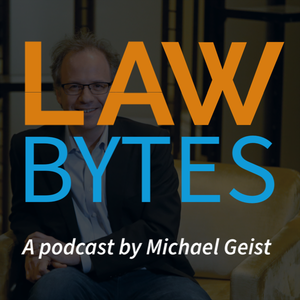
Law Bytes
Michael Geist
In recent years the intersection between law, technology, and policy has exploded as digital policy has become a mainstream concern in Canada and around the world. This podcast explores digital policies in conversations with people studying the legal and policy challenges, set the rules, or are experts in the field. It provides a Canadian perspective, but since the internet is global, examining international developments and Canada’s role in shaping global digital policy is be an important part of the story. Lawbytes is hosted by Michael Geist, a law professor at the University of Ottawa, where he holds the Canada Research Chair in Internet and E-commerce Law and where he is a member of the Centre for Law, Technology and Society.
- 33 minutes 41 secondsEpisode 223: The Year in Canadian Digital Law and PolicyCanadian digital law and policy in 2024 featured the long-delayed online harms bill, controversial implementation of streaming and online news legislation, as well as a myriad of notable copyright, AI, and privacy court cases. Government legislation stalled in the House of Commons, but with trade battles over a digital services tax, a competition case against Google, and plans to kick TikTok out of the country, there were no shortage of high profile issues. For this final Law Bytes podcast of 2024, I go solo without a guest to talk about the most significant developments in Canadian digital policy from the past year.16 December 2024, 11:00 am
- 41 minutes 39 secondsEpisode 222: Robert Diab on Canadian Media’s Copyright Lawsuit Against OpenAICanada’s largest media companies came together recently to file a copyright infringement lawsuit against OpenAI, the owners of ChatGPT. I wrote about the suit, suggesting that the primary motivation behind the suit was likely the hope to kickstart settlement discussions with the hope of a licence. Robert Diab, a law professor at Thompson Rivers University, raised similar thoughts in his own piece on the lawsuit. Robert joins the Law Bytes podcast to discuss the case and its implications for copyright and AI in Canada.9 December 2024, 11:00 am
- 37 minutes 11 secondsEpisode 221: Inside My Canadian Heritage Committee Appearance on Freedom of ExpressionThe Standing Committee on Canadian Heritage has for the past month been conducting a study on protecting freedom of expression. The counters of the study aren’t entirely clear. In fact, after I was invited to appear, I asked for some sense of what the committee was looking to address. There wasn’t much detail, which has really left it open for witnesses to cover whatever issues they like. I chose to focus my time on two issues: the expression implications of Canadian digital policy and the chilling effect of antisemitism. The two issues have really dominated my attention in recent months. Digital policy – including Bills C-11, C-18, C-63, and S-210 for years now and the antisemitism issues an enormous concern post October 7, 2023. This week’s Law Bytes podcast takes the listener into the hearing room and the wide range of questions from Liberal, Conservative, and Bloc MPs my opening statement sparked.2 December 2024, 11:00 am
- 30 minutes 24 secondsEpisode 220: Marina Pavlović on the CRTC’s Plans to Address Consumer Frustration Over Wireless ContractsConsumer frustration with just about everything associated with Canadian communications services is well known. The list of concerns is long: high prices, contracts that lock in consumers but not providers, gaming prices to make comparison shopping difficult, and confusing consumer codes among them. As politicians have begun to take notice, the CRTC has suddenly become more active with several consultations and new consumer focused initiatives. My colleague Marina Pavlović, a law professor at the University of Ottawa, has been at the forefront of consumer rights law and communications services for many years. She joins the Law Bytes podcast to talk about the ongoing consumer challenges and the latest CRTC developments.25 November 2024, 11:00 am
- 27 minutes 54 secondsEpisode 219: Scott Benzie on What the Corporate TikTok Ban Means For Canadian Digital Creators
The recent announcement of a Canadian government decision to ban the corporate offices of TikTok but leave the app untouched has left many puzzled since the approach may actually make matters worse. The potential privacy and security risks associated with the app will remain but the ability to hold the company accountable will be weakened.
While the government has downplayed the impact of the decision, the reality is that a TikTok exit from Canada will have an impact on Canadian digital creators. This Law Bytes podcast breaks down the implications, including a discussion with Scott Benzie, the Executive Director of Digital First Canada, who identifies the digital creator concerns.
The podcast can be downloaded here, accessed on YouTube, and is embedded below. Subscribe to the podcast via Apple Podcast, Google Play, Spotify or the RSS feed. Updates on the podcast on Twitter at @Lawbytespod.
Credits:
CBC News, Ottawa Bans TikTok’s Canadian Operations - But Not the App, November 7, 2024
18 November 2024, 11:00 am - 40 minutes 35 secondsEpisode 218: Emily Laidlaw and Taylor Owen on Saving the Online Harms Act
The Online Harms Act or Bill C-63 was introduced last February after years of false starts, public consultations, and debates. Months later, the bill appears to be stalled in the House of Commons and has yet to make it to committee for further study. Some view that as a win, given their criticism of the bill, though others who have waited years for action against online harms are beginning to fear that the Parliamentary clock is working against them. Emily Laidlaw, the Canada Research Chair in Cybersecurity at the University of Calgary and Taylor Owen, the Beaverbrook Chair in Media, Ethics and Communications at the Max Bell School of Public Policy at McGill University, have both been actively engaged in this issue for years, including their participation on the government’s expert advisory group. They join the Law Bytes podcast to discuss where things stand on Bill C-63 and the steps they recommend to get the bill back on track for study and debate.
4 November 2024, 11:00 am - 30 minutes 52 secondsEpisode 217: David Fraser on the Privacy Implications of the Federal Court of Appeal’s Facebook Ruling
It has been many years since the Facebook and Cambridge Analytica privacy scandal captured headlines. The services at the heart of the case no longer exist, but the legal case in Canada continues to march on. Last month, the Federal Court of Appeal overturned a lower court decision that had largely sided with Facebook. In its place, it released a new decision that includes and analysis of reasonableness under the Canadian privacy law and engages with the notion of a potential trust but verify standard in some cases when data is transferred to third parties. The case may not be over yet, but the latest decision has big implications for privacy in Canada. David Fraser, one of Canada’s leading privacy practitioners with McInnes Cooper and the creator a popular Youtube channel on privacy law, joins the Law Bytes podcast to provide the background on the case, assess the key findings, and consider what may come next.
28 October 2024, 10:00 am - 37 minutes 14 secondsEpisode 216: Game Changer or More of the Same?: Patrick Leblond on the New Global E-Commerce Agreement
For over 25 years, the World Trade Organization, an intergovernmental organization based in Geneva, Switzerland that regulates and facilitates international trade, has grappled with how to engage with e-commerce. What started as a moratorium on customs duties has expanded into the development of a new agreement that touches on a wide range of issues including privacy, data localization, and electronic contracting. The new deal has been heralded as groundbreaking, but some aren’t fully convinced that it actually does break new ground. Patrick Leblond is a University of Ottawa professor in the Graduate School of Public and International Affairs where he specializes in economic governance and policy, with a focus on North America, Europe and, increasingly, China. He joins the Law Bytes podcast to talk about the latest developments and assess the potential impact of the WTO’s new e-commerce agreement.
21 October 2024, 10:00 am - 34 minutes 35 secondsEpisode 215: Jan Grabowski on Wikipedia’s Antisemitism Problem
This podcast drops on Monday, October 7th, the one-year anniversary of the largest massacre of Jews since the Holocaust. I’ve largely kept the issue the rising tide of antisemitism since the Hamas terrorist attacks off the Law Bytes podcast, but those that follow my work will know that I have been vocal on social media and the mainstream media expressing my shock and concern. This episode blends my professional focus on digital policy with my personal concerns regarding antisemitism.
The alarming rise of antisemitism over the past year has left many - myself included - in shock. I see it in my social media mentions and on popular sites such as Wikipedia, where it has cropped up on entries involving issues like Zionism and even in the targeting of groups like the Anti-Defamation League. Wikipedia’s antisemitism problem may not have come as a surprise to Professor Jan Grabowski, a professor of Holocaust studies at the University of Ottawa. He conducted a detailed study on the issue in 2023 which focused on the Holocaust page involving Poland, his area of expertise. Professor Grabowski joins the Law Bytes podcast to talk about his work, his Wikipedia study, and the threat of disinformation on the site.
7 October 2024, 10:00 am - 33 minutes 35 secondsEpisode 214: Erin Millar on Trust in Media and the Implementation of the Online News Act
Questions about trust in the media have escalated in Canada in recent months as with each error or questionable tweet, there is seemingly an inevitable chorus of concerns that raise doubts about the implications of government regulation and funding of the media. So where is the Online News Act at right now? What of the new collective designed to distribute the $100 million that Google agreed to pay in return for an exemption from mandated arbitration? And what can be done about the mounting trust deficit?
Erin Millar wears several hats including as the CEO & Co-founder of Indiegraf and the interim board chair of the Canadian Journalism Collective, the collective that was picked by Google to administer the $100 million distribution. She joins the Law Bytes podcast in a personal capacity to talk about the latest Bill C-18 developments and what measures might help address trust in Canadian media.
30 September 2024, 10:00 am - 32 minutes 38 secondsEpisode 213: Elaine Craig on Mainstreaming Porn and Why Bill S-210 May Make Matters Worse
Bill S-210, the controversial age verification bill which purports to limit access to pornography for those under 18, could be headed for a final vote of approval in the House of Commons within the next couple of weeks. Much of the concern with the bill has focused on the privacy and free speech implications of mandating the technology and opening the door to website blocking. Yet often missing from the debate has been a deeper, more nuanced examination of pornography including distinctions between unlawful and so-called awful but lawful content, the role and responsibility of pornography platforms, and alternatives to the S-210 reliance on blocking and age verification technologies. That gap in the debate has now been filled by Professor Elaine Craig of the Schulich School of Law at Dalhousie University in her new book, Mainstreaming Porn. Professor Craig joins the Law Bytes podcast to discuss the book, the massive influence of porn platforms, the problems with Bill S-210, and the legal mechanisms she thinks would best address the issue .
23 September 2024, 10:00 am - More Episodes? Get the App
Your feedback is valuable to us. Should you encounter any bugs, glitches, lack of functionality or other problems, please email us on [email protected] or join Moon.FM Telegram Group where you can talk directly to the dev team who are happy to answer any queries.
 This Matters | Daily News Podcast
This Matters | Daily News Podcast
 The Decibel
The Decibel
 It's Political with Althia Raj
It's Political with Althia Raj
 The Agenda with Steve Paikin (Audio)
The Agenda with Steve Paikin (Audio)
 CANADALAND
CANADALAND